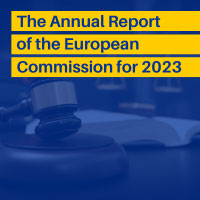The Annual Report of the European Commission for 2023 – Serbia Regresses in the Prosecution of War Crimes
 On November 8th, 2023, the European Commission (EC) adopted an annual report assessing the situation and progress of the Republic of Serbia on its path to accession to the European Union.
On November 8th, 2023, the European Commission (EC) adopted an annual report assessing the situation and progress of the Republic of Serbia on its path to accession to the European Union.
Under Chapter 23 concerning the judiciary and fundamental rights, the EC report includes an assessment of the work of relevant state institutions regarding war crimes trials in Serbia, particularly the Public Prosecutor’s Office for War Crimes (PPOWC), their cooperation with regional and international actors, as well as the efficiency and dedication to criminal justice processes.
The conclusions from the EC report largely correspond to the state and problems continuously highlighted by the Humanitarian Law Center (HLC), concerning inefficiencies and lack of transparency in the work of PPOWC, a small number of filed indictments which are usually against mid- and low-ranking perpetrators, poor regional and international cooperation of judicial bodies. Additionally, the report criticizes the frequent glorification and support offered by high state officials to individuals convicted of war crimes, the challenging of judgments by international courts, and the practice of denying the Srebrenica genocide without consequences.
From the standpoint of supporting victims of war crimes, it’s crucial to note that the EC criticized the practice of Serbian courts not awarding compensation to victims of war crimes during criminal proceedings, despite the law allowing it, a matter that the HLC has insisted on for years.
In 2022, a regional database of active cases of missing persons in armed conflicts in the former SFRY was established, and managed by the Missing Persons Group. In 2022, the remains of 106 individuals were found, and by the end of July 2023, another 55 disappearance cases were resolved. In May 2023, Serbia and Kosovo adopted a joint Declaration on missing persons. The report reminds that there are still 9,781 persons whose remains are sought in the region.
The report states that PPOWC’s cooperation with the International Residual Mechanism for Criminal Tribunals (IRMCT) continued, although Serbia still neglects its obligation to extradite members of the Serbian Radical Party, Vjerica Radeta and Petar Jojić, accused of contempt of court.
The EC highlighted that in May of this year, a final judgment by the IRMCT was issued in the Stanišić and Simatović case, concluding the trials for war crimes before the international court in the former Yugoslavia case. Despite this, institutions and state officials have not reacted to the judgment, which established that Stanišić and Simatović, former leaders of the State Security Service of the Ministry of the Interior of the Republic of Serbia, as participants in a joint criminal enterprise, were responsible for crimes committed across Bosnia and Herzegovina, including the murder of Marija Senaši in Dalj Planina in Croatia, and the fact that an international armed conflict was conducted on the territory of BiH.
Regarding regional cooperation in prosecuting war crimes, no progress has been recorded in cooperation with judicial authorities in Croatia. PPOWC and the Prosecutor’s Office of BiH signed a bilateral agreement in November 2022 concerning cooperation in supporting witnesses, injured parties, and victims in criminal proceedings. Additionally, the EC reiterated that Serbia has not recognized and executed the final judgment of the BiH Court against General Novak Đukić, who resides freely in Serbia. In 2014, Đukić was sentenced to 20 years in prison for ordering an artillery attack on the Tuzla Gate on May 25, 1995, during which 71 people were killed and around 140 were injured.
In December 2022, the Public Prosecutor’s Office for War Crimes adopted a new Prosecutorial Strategy for the investigation and prosecution of war crimes in the Republic of Serbia for the period from 2023 to 2026. According to the EC findings, PPOWC has not established a list of priority cases and high-profile cases that it is obliged to timely prosecute. The procedure for selecting a new prosecutor for war crimes initiated in November 2022 has not yet been concluded, and the High Council of Prosecution decided in May 2023 that prosecutor Snežana Stanojković continues to perform the function of public prosecutor of PPOWC despite her mandate expiration.
The efficiency of PPOWC’s work during 2022 was analyzed, stating among other things that out of 14 individuals indicted, five held high-ranking officer status at the time of the war crime. HLC notes that four out of the five high-ranking officers mentioned in the EC report are actually pilots of the Croatian Air Force, against whom PPOWC filed an indictment in March 2022. They are not available to Serbian judicial authorities, and the Belgrade Higher Court has not yet decided on conducting this trial in absentia. Dušan Lončar, Commander of the Second Proletarian Elite Motorized Brigade of the Yugoslav People’s Army, is the only high-ranking officer currently being tried based on an indictment filed by PPOWC last year.
The EC report states that in 2022, three cases dealing in full or partially with the crime of sexual violence in war were prosecuted, while PPOWC brought one indictment against Lazar Mutlak, accused of raping a Bosniak woman in May 1992 in the municipality of Goražde. HLC emphasizes that prosecuting individuals responsible for sexual violence in war should be a priority for PPOWC and that a decision on awarding restitution claims for victims should be made during the criminal proceedings.
The European Commission concluded in its report that the prosecution of war crimes in Serbia has significantly regressed in recent years and that it is essential for Serbia to make a serious effort in initiating proceedings for war crimes, focusing on those involving high-ranking officers. This is crucial, especially considering that over 1,700 cases are in the pre-investigation phase at PPOWC.








